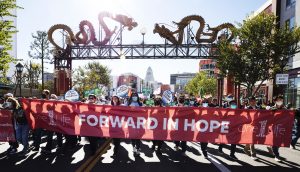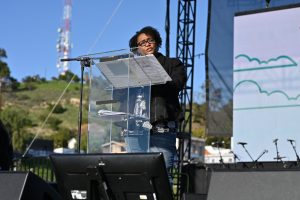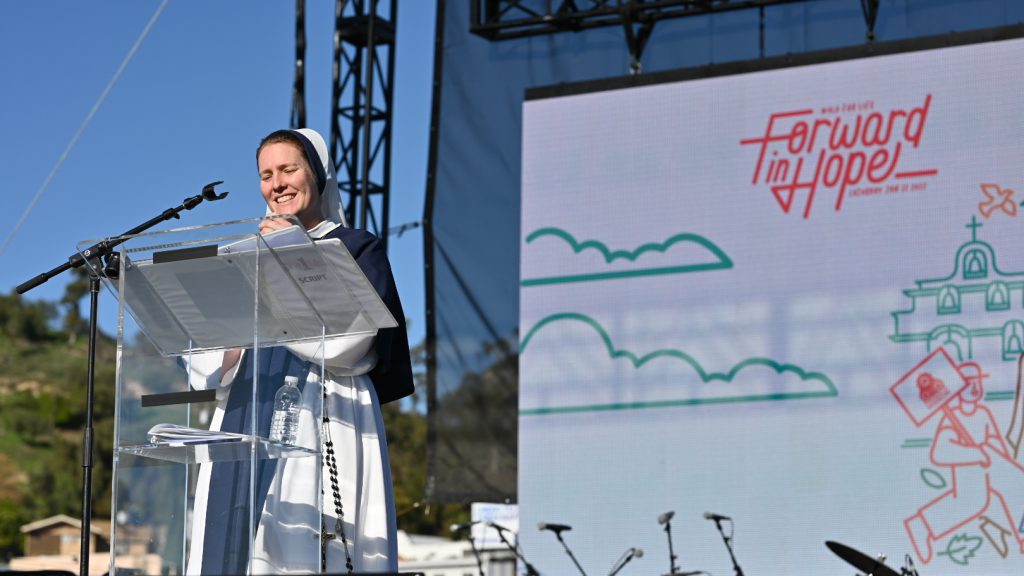If this year’s OneLife LA event, themed “Forward in Hope!,” was going for hope, the day delivered.
For several hours on Saturday, Jan. 22 in downtown Los Angeles, the word seemed to hang in the air. It was on the signs, the banners, and the words spoken by the lineup of speakers — some of whom acknowledged the real possibility that the U.S. Supreme Court could overturn the landmark Roe v. Wade decision later this year.
“This year I am really hopeful,” the event’s founder, Los Angeles Archbishop José H. Gomez, told the crowds. “I believe this year is going to mark a turning point in our long journey to build a culture of life.”
There was also, however, the hope felt by simply seeing each other’s faces again. OneLife was back as an in-person gathering this year, after having gone to a virtual format in 2021 due to COVID-19 concerns. But this year, thousands of pro-lifers from around the state joined the walk once more, from Olvera Street to Los Angeles State Historic Park, where a lineup of pro-life speakers and entertainers shared their own messages of hope.

Keynote speaker Sister Bethany Madonna appealed to the audience with the words from the Letter of St. Peter: “Always be prepared to give a reason for your hope.”
As a Sister of Life, Sister Bethany and members of her order accompany pregnant mothers in difficult circumstances, and she reminded the audience of their own part to play in that mission: “Even one person can make a difference in letting women know that they are loved…that they are not alone and they are capable.”
She shared personal stories of the witnesses that can change the course of lives — praying a rosary in front of an abortion clinic, taking a walk with a pregnant mom.
“You do not know the fruit of your prayers, your sacrifices, your living witness,” she said. “Lives can change in an instant.”
Sister Norma Pimentel, who was named one of Time’s most influential people last year for her work with immigrants at the border in Texas, stressed the importance of working together to make a hopeful future. She reminded the audience that it is “only by embracing life” that we will be able to “transform a world of indifference.”
“Families suffer so much at the border,” she said. “They are needing us to be a voice for them, to speak up and defend life… All they want is an opportunity to care for their children.”
“Why cannot we defend life — all life — and come together as one presence that helps to bring hope to them?”
Pro-life radio host Gloria Purvis related her own experience of struggling with infertility and learning to trust in God’s plan.
“The cross of infertility is very, very heavy, and it wasn’t one that I myself carried well,” she recalled. In her years of infertility, she shared that she and her husband had worked tirelessly to spread God’s message for families and parents, leading Pre-Cana workshops, advocating at abortion clinics, but still struggling with their own path of wanting children and being unable to conceive.

“After 15 years of infertility, I conceived, [and] the doctor suggested that I abort.” Purvis’ story highlighted the struggles women face from traditional medicine, even married mothers with stable jobs and insurance, but who may not be carrying a “perfect” baby.
“They didn’t respect my choice,” Purvis said of the conversations she had with her doctor, “and to make the point even more, she said to me, what is your husband going to say when you give birth to an extremely disabled child?”
Purvis ended her speech by calling out her daughter, Lourdes, to greet the crowd. “This is the fruit of persevering and of loving as Christ loved.”

